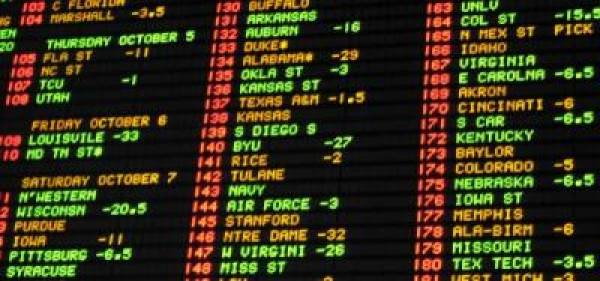USA Today Editorial: Two Opposing Views on State Wagering

Our view on legalized gambling: Cash-strapped states bet on a bad hand
Plans to legalize sports wagers and add video poker carry social costs.
Several states, facing budget shortfalls because of the recession, think they've found their ace in the hole: Expand gambling and pocket the tax revenue.
Ohio is adding 17,500 slot machines at race tracks. Illinois has sanctioned video pokers at bars, and Pennsylvania's legislature is considering doing the same.
More troubling, other states now want to introduce sports wagering - a new escalation in the nation's steady expansion of gambling. Delaware, one of four states grandfathered under a 1992 federal law that bans betting on sports (the others are Nevada, Montana and Oregon), has decided to allow it - and is being sued by an anxious NFL, the NCAA and other leagues. Neighboring New Jersey, meanwhile, understandably wants to protect its gaming industry and is suing for permission to offer sports wagering, too.
If you think states are looking for dough in all the wrong places to fill budget holes, you've hit the jackpot.
Proliferation of gambling, of course, is nothing new in the USA. A dozen states have commercial casinos, 29 have Indian casinos, 40 allow parimutuel wagering and 44 have state lotteries. But as the recession intensifies the scramble for gaming revenue, it's worth pausing to consider what's been learned so far. For the relatively modest amount of tax revenue that gambling produces in most places - last year's $6.8 billion was just 1% of state tax receipts nationwide it buys a disproportionate amount of problems:
Addiction. States looking at video poker for fiscal salvation should consult folks in South Carolina, where it was legal from 1986 to 2000. By 1999, about a fourth of the state's retail businesses - ranging from bowling alleys to convenience stores - included gambling opportunities for customers. Video poker became known as "the crack cocaine of gambling." In one tragic case that galvanized public opinion, a 28-year-old mother played video poker for seven hours while her forgotten 10-day-old baby suffocated to death in the hot car. When the video poker machines were banned, attendance at Gamblers Anonymous meetings plunged, as did calls to the state's most popular gamblers' hotline.
Scandal. Sure, sports betting is legal in Las Vegas, and there's plenty of illegal sports betting everywhere else. But making single-game betting more widespread and easily accessible, as Delaware and New Jersey want to do, crosses a new threshold. It is almost guaranteed to encourage point shaving, lead to fixed games and damage the integrity of sports.
NFL Commissioner Roger Goodell credibly argues that it would create intense suspicion about every dropped pass or blown call. NBA Commissioner David Stern warns that games would increasingly be viewed through a "prism of the impact on the betting line." If the courts reject the sports leagues' lawsuit, Congress may need to revisit the issue.
Aside from the long-term economic and social costs of gambling, recent news suggests that it's not even a reliable short-term solution to fiscal problems. Several states have seen promised windfalls fall short of projections. Last year, casino gambling tax proceeds fell 2.2%. And the more gambling spreads, the more it becomes a zero-sum game as states compete for the same pot.
Gambling is here to stay, but by seeking to expand it as a something-for-nothing solution to budget shortfalls, states are only ducking tough choices between raising taxes or cutting services. For states serious about building sound economic foundations, the notion that gaming is the answer is, like the big Vegas casino of the same name, a mirage.
---------
Opposing view: Give public what it wants
Legal sports betting benefits good causes instead of organized crime.
By Raymond Lesniak
Should sports betting be allowed so states can get more revenue to balance their budgets? If that's the only rationale, then absolutely not. But it should be allowed because the American public wants it, enjoys it and has to go through illegal channels to bet on sporting events, unless bettors live in or are visiting Las Vegas.
Throughout Europe, sports betting is legal. It has had little effect on the integrity of their sports. In fact, any effort to fix outcomes would be more likely to be uncovered if legal betting were available, allowing unusual betting patterns to be detected more readily.
In New Jersey, the receipts from legal wagering are channeled to programs that help seniors afford health care, educate our kids and redevelop some of our most economically disadvantaged areas. The proceeds from illegal sports betting are funneled into prostitution, the illegal weapons trade and the drug trade.
I would much rather have the revenue from sports betting fund legitimate causes that benefit the public good, not criminal enterprises. If those who oppose sports betting had the honesty to shut it down in Las Vegas, I could at least understand their position, although it would still thrive through offshore Internet operations and local bookies run by organized crime.
But as a resident of New Jersey, I can't accept our casinos in Atlantic City being empty during Super Bowl week and Final Four Weekend, while reservations in Las Vegas are impossible to get. Sports betting attracts tourists, and tourism is New Jersey's No. 2 industry, right behind the pharmaceutical industry. To deprive New Jersey of this attraction and give it exclusively to Nevada is wrong and, I believe, unconstitutional.
That's why I filed suit in federal court - to right this wrong. As Captain Renault said to Rick in Casablanca: "I'm shocked, shocked to find that gambling is going on in here!" Sports betting is going on in America, lining the pockets of offshore Internet operators, organized crime betting rings and legal operators in Nevada's casinos. Makes sense to you? It doesn't to me.
Raymond Lesniak, a Democrat, serves in the New Jersey state senate.













